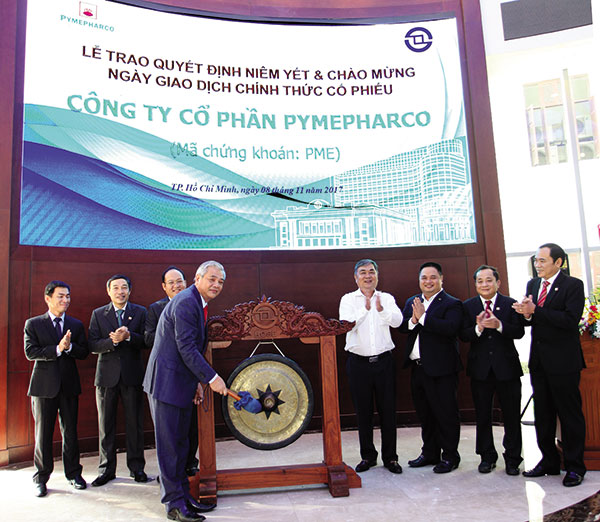Capital flow and reforms unite for pharma sector
 |
| State divestments and loosened foreign ownership caps will benefit local pharma stocks, Photo: Le Toan |
An adrenalin rush
Although it has always been a favourite among foreign investors, the pharmaceutical sector has generated more buzz than usual in recent weeks. One reason is because the stake sale of Domesco is likely to take place next Tuesday, December 12, in which the state will part with 34.71 per cent of the firm.
As Domesco has already abandoned its foreign ownership limit, their strategic partner Abbott is regarded as the strongest contender in the auction. Until now however, Abbott, which already owns 51 per cent of Domesco, has kept quiet about its intentions.
Last month, drug-maker Traphaco also made headlines as 40 per cent of its shares were transferred from investment funds Mekong Capital and Vietnam Holding to Magbi Fund Ltd. (Hong Kong) and Super Delta Pte., Ltd. (Singapore). It remains unclear whether these two are financial or strategic investors, as they were both established just a few months ago with very little information available.
Traphaco’s chairwoman Vu Thi Thuan told VIR that the divestments were a success for the two funds, especially Mekong Capital, which stayed with Traphaco for more than 10 years. “Foreign investment funds are really interested in Vietnam’s pharmaceutical industry. Traphaco has gained great attention thanks to our growing business performance, which is better than the sector average,” she said.
The market is also waiting for the possible removal of DHG Pharma’s limit on foreign ownership. Similar to Domesco and Abbott, DHG Pharma’s strategic investor, Taisho, is widely expected to increase its position in the firm.
Ripe for M&A
The foreign ownership cap, which stands at 49 per cent, remains a major roadblock for foreign investment into Vietnam’s pharmaceutical industry. For instance, foreigners cannot invest in the newly-listed Pymepharco, Vietnam’s second-most-profitable drug-maker, as 49 per cent of its shares are already owned by Germany’s Stada Arzneimittel AG.
EuroCham’s Pharma Group commented that a clear path in converting partnerships into majority ownerships would provide overseas firms with stronger arguments to invest in Vietnam.
It is likely that foreign investors will fight for merger-and-acquisition (M&A) deals with Vietnamese partners, as they are forbidden by Vietnamese law to distribute pharmaceutical products on their own.
In a recent report, Vo Thi Ngoc Han, head of industrial sector research at Ho Chi Minh City Securities Corporation, said that she expects the foreign ownership cap at DHG Pharma to be scrapped by the end of this year, paving the way for Taisho to launch a tender offer in the first half of 2018.
“Taisho’s interest in increasing their stake is keeping the M&A story alive, and is the main medium-term catalyst for the firm’s stock. Timing depends on if and when the state agrees to sell stake,” she noted.
Michael DC Choi, senior deputy director of the Korea Trade-Investment Promotion Agency, told VIR that some M&A deals between Vietnamese pharma firms and South Korean investors are already underway. “The Koreans now prefer M&A deals as a way to reduce set-up costs and gain quicker access to Vietnam’s pharmaceutical market,” Choi said.
Another cause for concern that investors may have is price. Vietnamese pharma stocks have been rallying over the past year, pushing their price-per-earning ratio (P/E) high above the market average of 16x. In particular, Traphaco JSC is trading at 24 times its earnings, Imexpharm at 21x, and Domesco at 18.94x.
However, analysts at BIDV Securities pointed out that compared to the Asia-Pacific average of 31.09x, the P/E ratios of major Vietnamese drug-makers are still very attractive for foreign investors, who would like to cash in on this growing market.
“Besides other major drug makers, investors may want to consider Bidiphar JSC, which is Vietnam’s only producer of anti-cancer medicine. The number of cancer patients in Vietnam may reach 190,000 in 2020, which creates a strong growth opportunity for this pharmaceutical firm,” noted the analysts.
What the stars mean:
★ Poor ★ ★ Promising ★★★ Good ★★★★ Very good ★★★★★ Exceptional
Latest News
More News
- Cashless payments hit 28 times GDP in 2025 (February 04, 2026 | 18:09)
- SSIAM and DBJ launch Japan Vietnam Capital Fund (February 04, 2026 | 15:57)
- Banks target stronger profits, credit growth in 2026 (February 04, 2026 | 15:43)
- Vietnam on path to investment-grade rating (February 03, 2026 | 13:07)
- Consumer finance sector posts sharp profit growth (February 03, 2026 | 13:05)
- Insurance market building the next chapter of protection (February 02, 2026 | 11:16)
- NAB Innovation Centre underscores Vietnam’s appeal for tech investment (January 30, 2026 | 11:16)
- Vietnam strengthens public debt management with World Bank and IMF (January 30, 2026 | 11:00)
- Corporate bond market poised for stronger growth cycle (January 28, 2026 | 17:13)
- Vietnam's IPO market on recovery trajectory (January 28, 2026 | 17:04)
















 Mobile Version
Mobile Version